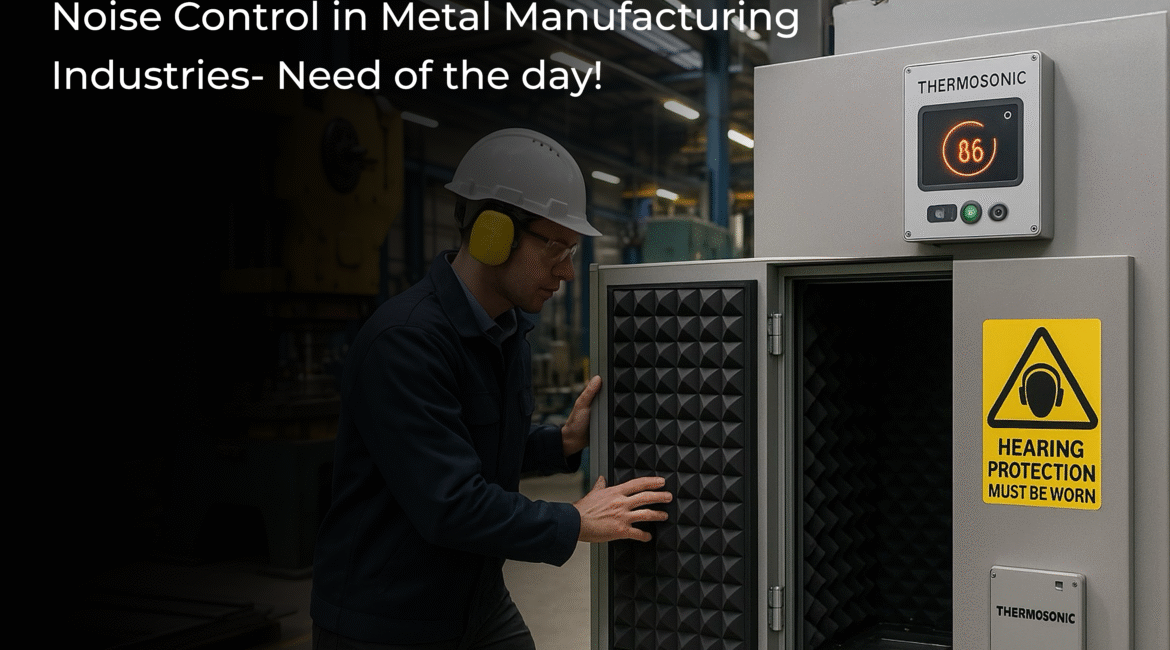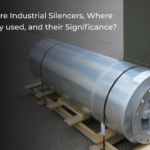Industrial development and advancement is crucial for India’s economic development as it helps create jobs, fosters innovation and drive growth. In the heart of industrial advancement lies metal manufacturing—an essential sector that powers everything from automotive production to construction and infrastructure development. However, behind the towering machinery and rhythmic metal clangs lies an often-overlooked concern: industrial noise pollution.
Metal manufacturing units are among the noisiest workplaces, and the effects of prolonged exposure to such high-decibel environments are far-reaching. Controlling noise in metal manufacturing industries is not just a regulatory requirement—it’s a health imperative and a productivity booster. In today’s rapidly industrializing world, it has become a need of the day.
The Noise Problem in Metal Manufacturing
Metal manufacturing involves various stages such as casting, forging, cutting, drilling, and finishing—all of which generate substantial noise levels. Equipment like punch presses, CNC machines, grinders, rolling mills, and plasma cutters can produce sound levels that exceed 90-110 dB, which is well above the safe exposure limit of 85 dB, as recommended by occupational safety agencies like Directorate General of Factory Advice Service and Labour Protection that is a part of Ministry of Labour and Employment.
The ill effects of long-term exposure to such noise levels can lead to:
- Noise-Induced Hearing Loss (NIHL)
- Stress and fatigue
- Reduced concentration and productivity
- Increased risk of workplace accidents
- Communication barriers among workers
Given these risks, controlling noise is not just about compliance; it’s about protecting human capital, enhancing workplace conditions, and ensuring long-term operational sustainability.
Why Is Noise Control the Need of the Day?
1. Worker Health and Safety
Studies carried out by the National Institute of Occupational Health, India, showed that the sound pressure levels were very high in various industries of India which including metal manufacturing, textile industries, and pharmaceutical firms.
The most pressing reason for implementing noise control in metal industries is the health and well-being of workers. Prolonged exposure to industrial noise can cause irreversible hearing damage, affecting not just professional but also personal lives of workers. Beyond hearing loss, high noise levels can elevate stress hormones, disrupt sleep, and even impact cardiovascular health.
2. Regulatory Compliance
The DG-FASLI (Directorate General Factory Advice Service and Labour), which focuses on occupational safety and health, including noise pollution, has set permissible noise levels and guidelines for factories to reduce employee exposure. As per DG-FASLI rules and guidelines, the permissible noise exposure limit for employees is 90 dB (A) for an 8-hour day, with 115 dB (A) permitted for 15 minutes. The guidelines clearly state that no employee should be exposed to sound pressure levels exceeding 140 decibels.
3. Improved Productivity
Noise may not seem like an obvious productivity killer, but numerous studies confirm that a quieter workspace enhances focus, communication, and decision-making. Reducing noise can significantly improve work output, particularly in tasks that require precision, such as quality control, welding, and CNC operations.
4. Rising Worker Awareness
As per research findings published in the National Library of Medicine, in developing country like India, 63 million people suffer from noise-induced hearing loss (NIHL) due to industrial sound pollution. Today, employees are more aware of their rights and demand safe working places, including quieter workplaces.
Techniques for Noise Control in Metal Industries
Noise control can be approached in multiple ways, broadly categorized into engineering controls and personal protective equipment (PPE). Here we take a look at engineering controls that are most effective in curbing noise pollution in metal industries.
Engineering Controls
These are the most effective and sustainable methods to reduce noise at its source or along its path.
Acoustic Enclosures: Encasing noisy machines in soundproof cabinets to contain noise can reduce the noise pollution significantly and protect workers from the ill effects of high-pitched noise. You can get acoustic enclosures for machinery used for reshaping materials, primary metals through rolling, bending, stamping, and extrusion. Metal manufacturing industry can also install acoustic enclosures for noisy rotary equipment.
Audiometric Booth– In many cases, the complicated design of equipment prevents the use of acoustic enclosures in metal industries. In such scenarios, you can install Audiometric booths that can help achieve noiseless operation of up to 30 to 40 decibels. Audiometric booths are self-standing structures that can be easily installed and removed as needed. Their portable and modular design makes them ideal for locations where you need temporary solutions. These booths can be installed for specific noise sources flexibly.
Soundproof operator cabins – Acoustic enclosures come in various form. Metal industries have several noisy machines and it is not possible to install soundproofing solutions around every noisy equipment due to various reasons. In such scenarios, metal industries can install soundproof operator cabins that provide a safe and quiet place for personnel to oversee machine operations and monitor their performance.
Wrapping Up:
Noise control in metal manufacturing industries is no longer optional—it’s a strategic necessity. Protecting workers from hazardous noise levels isn’t just about following the law; it’s about valuing human health and optimizing performance. As industries strive to modernize and embrace sustainability, noise mitigation must be a core component of that transformation.
By investing in the right technology, training, and infrastructure, metal manufacturers can create safer, quieter, and more productive workplaces. After all, a healthy workplace is the foundation of a thriving industry, and controlling noise is a sound investment in that direction.






